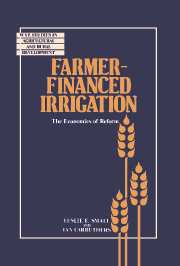Book contents
- Frontmatter
- Contents
- Preface
- 1 Irrigation financing in perspective
- Part I Analysing financing policies: theory and concepts
- Part II Criteria for evaluating irrigation financing policies
- 4 Cost-effective operation and maintenance
- 5 Allocating a scarce resource: water-use efficiency
- 6 Improving investment decisions
- 7 Resource-mobilisation efficiency
- 8 The concern for equity
- Part III Financial autonomy and user fees: key implementation issues
- Notes
- Index
8 - The concern for equity
Published online by Cambridge University Press: 05 November 2011
- Frontmatter
- Contents
- Preface
- 1 Irrigation financing in perspective
- Part I Analysing financing policies: theory and concepts
- Part II Criteria for evaluating irrigation financing policies
- 4 Cost-effective operation and maintenance
- 5 Allocating a scarce resource: water-use efficiency
- 6 Improving investment decisions
- 7 Resource-mobilisation efficiency
- 8 The concern for equity
- Part III Financial autonomy and user fees: key implementation issues
- Notes
- Index
Summary
Irrigation (unlike rainfall) is sustained by the deployment of resources. If we want irrigation, we must therefore provide the needed resources on a continuing basis. But resources will not be provided unless someone pays for them. A key question that must be addressed in establishing irrigation financing policies is: Who should pay for these resources?
No unique, objective and universal answer exists to the question of who should pay for irrigation; rather, it is a question that must be answered through the political process. In any given situation these political decisions are likely to reflect perceptions of efficiency, of equity and of the positions and political power of various interest groups. In this chapter we explore the relationships between concerns for equity and policies for irrigation financing and cost recovery.
As we noted in Chapter 2, two fairly distinct types of equity concerns can be identified. The first set involves questions of the distribution of income and wealth in society. These concerns for promoting a more equal distribution of income and wealth are subsumed in the term ‘vertical equity’. Considerations of vertical equity thus involve a ‘macro’ view of society in terms of broad social goals.
The second set of equity concerns, known as ‘horizontal equity’, reflects ‘micro’ considerations involving ‘fairness’ among individuals who are perceived to be equals in some sense. The underlying equity concept is that equals should be treated equally.
- Type
- Chapter
- Information
- Farmer-Financed IrrigationThe Economics of Reform, pp. 118 - 137Publisher: Cambridge University PressPrint publication year: 1991

